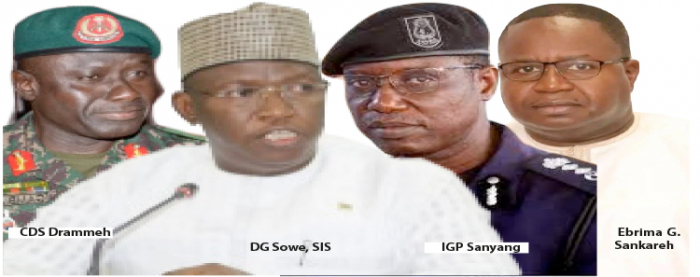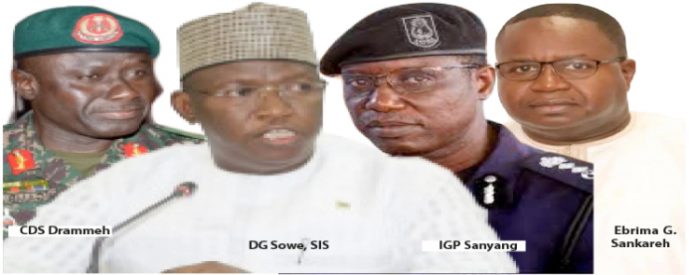“Tis pity of him. I fear the trust Othello puts him in On some odd time of his infirmity Will shake this island.” Othello
This phoney coup plot is the making of none other than DG Sowe of NIA. Since the appointment of Ousman Sowe, he has been fighting a rearguard action to maintain his position as the director general of NIA.
On two or three occasions, the president attempted to cut him loose and redeploy him abroad.
The Late Pa Nderry Mbye reported one incident (bless his soul). If it weren’t for the intervention of VP F Tambajang and OJ Jallow, he would have been given his marching others. His dismissal or redeployment would have nothing to do with Sowe’s role under the Jammeh regime as revealed at the TRRC, nor his cover-up and destruction of evidence of torture catalogued by the TRRC. It is personal to the president. Hence it is hanging over his neck like the Sword of Damocles.

To establish his loyalty, Sowe is reported to have been responsible for creating the Barrow Youth movement and First Lady’s charity foundation to assist the president in enriching himself. As he is accountable only to the president, under whose jurisdiction he is assigned, he syphoned funds from grants given to him from Saudi Arabia, in particular to these two organs, allegedly.
Creating insecurities for the President became his modus operandi, setting him off against any critic, especially disgruntled soldiers who felt neglected in favour of the Senegalese soldiers.
By my counting, this is the third phoney coup plot uncovered by DG Sowe; the first one was supposedly reported by President’s 8-year-old son at the time, having overheard a soldier talking about it.
The second one involved about nine soldiers, supposedly from one WhatsApp group, mainly of the Jola ethnic group. Why is this recent allegation given so much currency and prominence? It’s all about timing, as we shall see. What is consistently excellent about the President is that he never addressed the nation on this supposed crisis.
The president started militarising our politics and politicising our security forces when he puffed and thumped his chest about how he dealt with the 3 Years Jottna demonstration. Amidst the clamour and through bluster and hubris, he explained how he dealt with them with his newly bought equipment to punish the protests. Yet he failed to address the nation on potential threats that could have removed him unconstitutionally from power.
Furthermore, how can he be serious about condemning coups when he employed Coupists among the highest ranks of the military and within his staff, he talks to and dines with them every day, from the 1994 coup and the 30th December attack, respectively!!
You can count on your fingers the number of times the President addressed the nation following a crisis.
This attribute, according to him, was advice President Macky Sall gave him during his crash course in statecraft. He should never follow or give in to public opinion. If anything, he should make the news, and the public should follow him. Sounds familiar? Just look across the border. Given the “seriousness” of the plot, The President, who is responsible for statecraft, the minister of Defense, responsible for strategy or the CDS, accountable for the Armed forces, who stand accused, were nowhere to be seen.
They say a picture speaks a thousand words. Who was present at the press conference: security adviser Jeng who just took up his position, army PRO and DG Sowe, the most senior architect of the rumours? The poor NSA had to read a prepared statement for him without entertaining questions, but to protect his reputation, he had to say it was an allegation yet to be proven repeatedly. A markedly different statement was released by the President’s handlers a few days later as an affirmative coup plot. If ever there is an oxymoron, this is it.
Sowe will now double down to give this skeletal coup plot meat and clothe it with various aspects, from the president’s critics, home and abroad, to give credence to his cooked-up story and present it to the president, a typical Yaya Jammeh playbook he mastered.
Strategy is adversarial and seeks victory: whereas statecraft is merely competitive and seeks common ground and agreement, even within the coercive use of force. In conflict, statecraft and strategy are mismatched, as the former generally cannot overturn the latter due to the nature of their respective instruments. The plan must end; sooner or later, force must be lifted. It is the threat of damage to come that can make someone yield or comply.
It is the latent violence that can influence someone’s choice. It may also achieve effects quickly- indeed, the rapid achievement of impact is usually supremely desirable, as strategy assumes the mutual imposition of damage.
Statecraft, by contrast, usually employs means which take effect only slowly. Like strategy, statecraft is also about consequences. But unlike the approach, statecraft is less about conclusions than about continuation. The coercive tools of statecraft may end if the policy goal is achieved, but persuasive or rewarding instruments do not necessarily conclude. The policy question after that must be to determine which course of action is most palatable: accepting either the reciprocal employment of force or change to the status quo wrought by unilateral power.
The President should sit down with the national security council, with all the elements present, and get on creating a professional security establishment, bereft of any political alliances, upholding the constitution, the rule of law and human rights. Look around you in the subregion and see the politicised military and its outcome. Yes, we need a partnership with our neighbours, but we do not need to be in a vassal state of being at their beck and calling.
Article contributed by ANANMOUS Senior Member of Security Establishment
Nobody wants an unconstitutional change of government, military or civil. An objective encoded in the OAU Lomé Declaration of 2000, The Constitutive Act of AU 2002, and The African Charter on Democracy, 2007. It’s, therefore, preposterous to suggest that anyone attempted to overthrow President Barrow during the impasse, with these instruments in place, under the nose of ECOWAS heads of state, who were steering the process at the time.
If the Executive finds it expedient to purge your critics and perpetuate the unsustainable presence of ECOMIG by invoking a phoney coup as a Casus Belli, so to speak, beware of what you are instigating in the mind of soldiers. Cut loose the DG Sowe and get on with the security sector reforms.
If you are still reading this, you must have found it interesting, and please visit the Facebook Page “Open Gambia” Gambian Platform for National Dialogue. Like, follow and share our stories.


